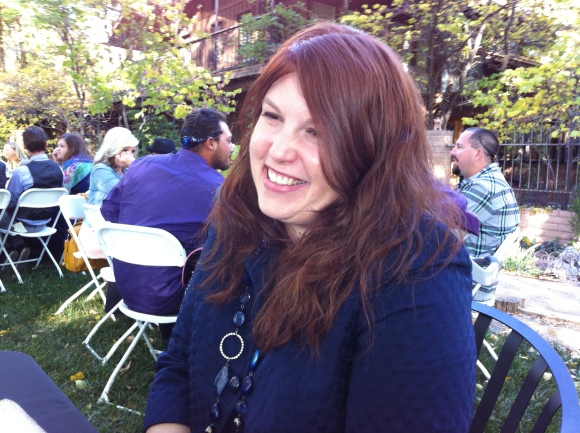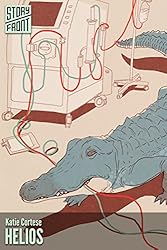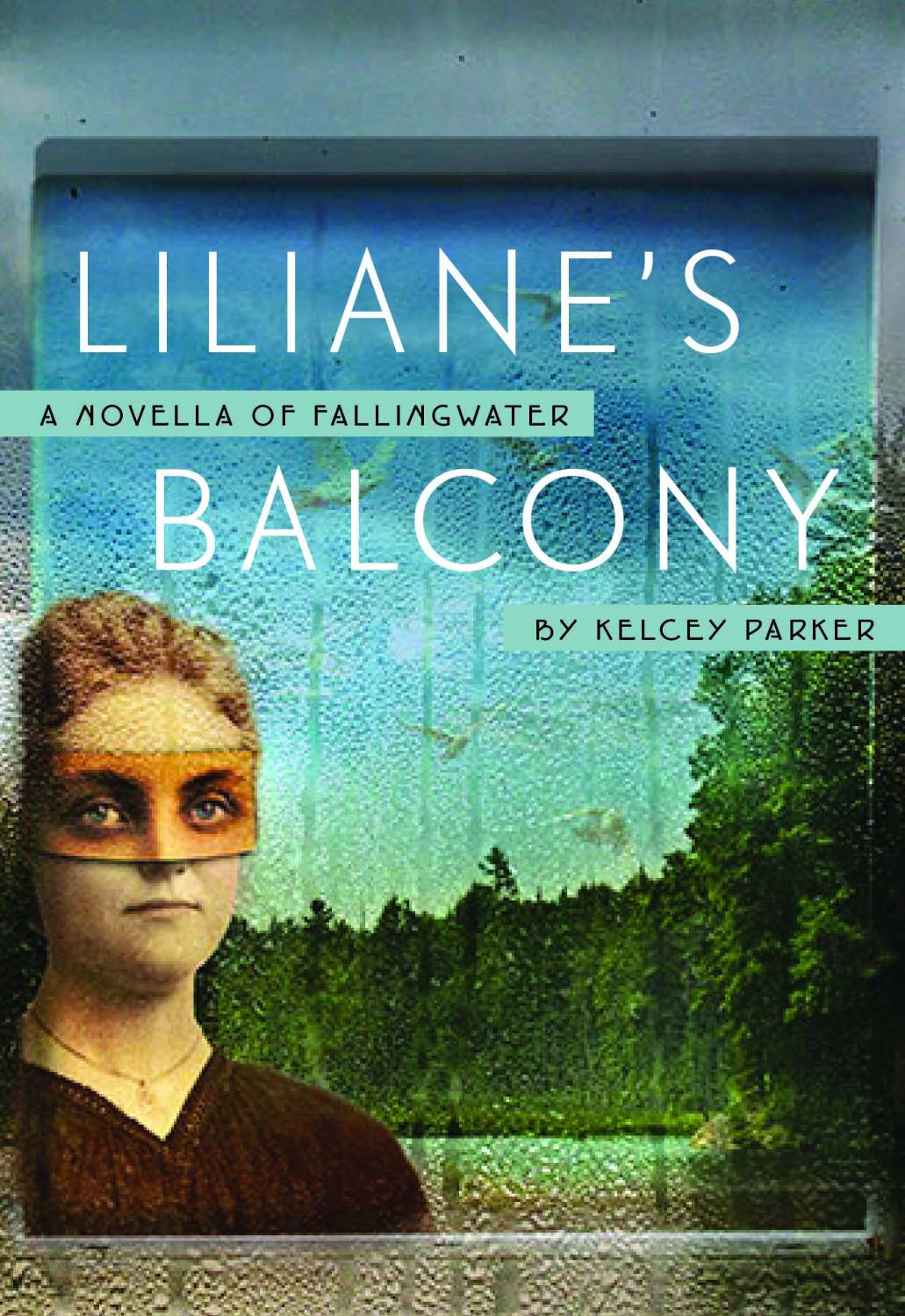Dear Writer,
Persistence is all.
Well, most. It’s most. The most important thing is not that you get a fancy degree or make money doing this (which is different from making a living, in my book), but that you come out of every story with more empathy for the human condition than you went in with.
Katie Cortese lives in Lubbock, TX, where she teaches in the creative writing program at Texas Tech University. Her stories and essays have appeared or are forthcoming in such journals as Blackbird, Gulf Coast, Sport Literate, and The Baltimore Review, as well as the upcoming Rose Metal Press anthology, Family Resemblance: An Anthology and Exploration of 8 Hybrid Literary Genres. She holds a PhD from Florida State University, an MFA from Arizona State University, and was granted a Tennessee Williams Scholarship to attend the Sewanee Writers’ Conference, as well as a residency at the Arte Studio Ginestrelle near Assisi, Italy. The former editor-in-chief of The Southeast Review, she now serves as the fiction editor for Iron Horse Literary Review, and her flash fiction collection, GIRL POWER AND OTHER SHORT-SHORT STORIES, is slated for release by ELJ Publications in the fall of 2015. She is currently at work on a full-length story collection as well as a novel.
Web site: http://www.katiecortese.com/
Featured at Talking Writing: This interview is part of a partnership with Talking Writing magazine. The How to Become a Writer Series here at PhD in Creative Writing includes interviews with Talking Writing’s featured writers. Here is an excerpt of Katie’s story “Flight Plan” published at Talking Writing:
Maya’s new apartment complex had eight units, four to a side across a small courtyard. She’d rented one of them, sight unseen, against her father’s advice. The landlady, Alma, was waiting in the parking lot as promised when Maya eased Black Beauty’s powerful engine to a stop. The ’79 Corvette celebrated the end of her cross-country romp in a musical crunch of gravel. Maya tried not to stare at the woman’s sun-spotted shoulders—or the amber folds of flesh melting down her thighs—and climbed into the heat of midday, bending to stretch her legs.
Alma gestured to Maya’s car with the business end of her cigarette. “She’s a prize.”
“Black Beauty,” Maya said. “Used to be my dad’s. She’s hell on gas.”
Story: “Flight Plan” at Talking Writing
Story: “Lemonade” at Chagrin Review
Story: “Gentleman’s Game” at Sequestrum
Story: “Wakulla Springs” at Baltimore Review
How Katie Cortese Became a Writer
This is the next installment in the How to Become a Writer interview series at Ph.D. in Creative Writing. Each writer answers the same 5 questions. Thanks to Talking Writing for sharing their writers, and thanks to Katie for her awesome answers!
1. Why did you want to become a writer?
The short answer is I didn’t, at first. I chose which colleges to apply to based on the strength of their theatre programs and at eighteen years old I had every intention of moving to New York and auditioning my heart out after graduation. I’d always loved to read, and I’d written a little in high school (just some angsty journaling and a few cheesy revenge poems that are—hopefully—lost to the annals of history), and I recognized the need for a more practical major alongside theatre—so, of course, I chose English, because teaching, right? By my senior year of college I’d taken a few fiction workshops and fell in love with a composition process I’m too old to replicate now—writing for eight hours at a stretch through the night, usually waking halfway through the next morning to find I’d slept through Geology again. I was still fifty-fifty as to pursuing acting or writing by my senior year, but I credit my eventual choice to two excellent professors. Doug Glover, a Canadian story writer and novelist, took me aside after one class and shook a rolled up copy of a recent story revision I’d handed him. It hit all the undergraduate landmarks: a husband who mysteriously died at sea, the melodramatic disposal of his ashes in the Atlantic Ocean, and a precocious child wise beyond his years. In any case, Doug waved around the tube of my revision and told me it was the best one he’d seen. Not the best story, he clarified, but the best revision. I’ve always been a little too hungry for praise.
The second professor who gave me a significant push in this direction was Steven Millhauser, and I had no idea how lucky I was to be able to work with him at the time. He told me not to get an MFA (in so doing, he alerted me to the fact that such a thing as grad school for writing existed), but to move home and write in my parents’ basement until either I got a book published or they kicked me out. Then he walked me down the hall to the director of the New York State Summer Writer’s Institute and set me up with a small scholarship to attend it. After that summer of being surrounded by teachers and students who’d made writing their lives, I tossed my headshots and acting resume in a drawer and haven’t looked back (okay, maybe once or twice).
2. How did you go about becoming a writer?
I got the writing bug in college, as I mentioned above, but I didn’t actually start my journey until I did the exact opposite of what I’d been advised in college. I applied to eleven MFA programs and got into two of them, one of which offered me funding. I got the news that Arizona State had offered me a place in their program while I was on a six-month work visa in London, typing a rambling eighty page novella on a Toshiba satellite roughly the size of a VCR (remember those?). I cried when my mother read my acceptance letter on the phone. After I was back in the States, I moved from my parents’ house in Massachusetts to Phoenix (by way of San Diego, but that’s another story). I’d never been further west than Pennsylvania. The heat was debilitating. I felt like a writer right up until my first workshop class, when I realized I was out of my league. Way out of my league. I didn’t actually start the process of learning to write until I realized how much I had left to learn, and how talented everyone else in my class (and beyond) was. Once I got over the feeling of not being the star pupil (which, I think, most of us in that MFA had been in college), I could finally stop trying to impress everyone and just try to be a better writer every day than the one I’d been the day before.
The short answer to how I became a writer is by writing and reading. A lot. I’d argue that’s how everyone does it, in some form or another.
3. Who helped you along the way, and how?
Wow, this is a very long list. There are those professors back in college I mentioned above, plus the amazingly talented Greg Hrbek who was the first person to introduce me to Denis Johnson’s Jesus’ Son. My friend Jillian Schedneck lived with me in London while she was applying for MFAs in Creative Nonfiction. She ended up going to West Virginia’s program, and got her PhD in Australia where she still lives and teaches. We still read each other’s work and I think we kept each other’s spirits up as ex-pats waiting for good news from home. My MFA teachers have been my rocks, and years later I’m still bugging them for advice and letters of recommendation and favors (maybe just to make sure they don’t forget me!): Melissa Pritchard, T. M. McNally, Ron Carlson, and all the visiting writers I was fortunate to work with in brief stints during my three years at ASU.
I tell my current students to hold onto their good readers because they are a rare commodity out in the cold, hard world, and that’s advice I practice. Most of my readers are my former MFA colleagues—truly generous and brilliant human beings who are now pursuing PhDs and working in tenure-track positions and publishing books every other year, it seems like. I went to Florida State for my PhD and will be forever grateful to my professors there—Mark Winegardner, Julianna Baggott, Elizabeth Stuckey-French. My husband is my first reader and biggest cheerleader. And my parents, of course. My mother had me memorizing Shakespeare at four years old. My father read me The Hobbit at bedtime every night for a year. If one of those links in the chain had given way, I might not have kept at this pursuit. There’s a lot of rejection. I’m guessing there always will be, but now I feel that I owe all of the people mentioned above my best effort and if I falter I imagine having to explain to one of them why I quit writing. I’m accountable to them, and thank god for that.

4. Can you tell me about a writer or artist whose biography inspires you?
For a long time, I’ve hung onto the fact that Laura Ingalls Wilder didn’t start writing until her fifties (or at least, that’s when she published her first book). I grew up with the Little House books, and so did most of my peers and their kids, and I hope my kids will grow up with those books too. It’s amazing to me that she taught herself how to write over the course of the series (sort of like J.K. Rowling, as far as that goes), though she had the tools because she had everything a writer needs to succeed: a love for literature (she was a teacher before she married Almanzo, of course), empathy for other humans, time (once the children were raised), patience, and persistence. Now her works are an institution unto themselves. That’s so cool to me.
I’m also interested in writers that had other abiding interests and/or careers. William Carlos William and his doctoring. Barbara Kingsolver has a degree in biology, and it shows in her work. I like Stephen King’s path to becoming a writer because his is a story of persistence and perseverance, drives which developed ahead of his talent and which every writer needs in order to get past those first few (thousand) rejections. I should have mentioned King earlier, actually, because he’s another reason I wanted to become a writer. His book It. Not the monster stuff, which is cool in a “this is why clowns can never not be creepy again” way, but I fell in love with those kids he writes about and the adults they became; I admire how he grew a fictional town from the ground up and invested it with a history that speaks to real towns all over America; I envy the way his language made me forget I was reading so I actually saw the story unfold, even if I would rather not have looked at some aspects as closely as he wanted me to. The first few stories I wrote were all imitations of It in one way or another. And then The Stand. And then The Body (which became the movie Stand By Me). Heck, maybe they still are.
5. What would you say in a short letter to an aspiring writer?
Dear Writer,
Persistence is all.
Well, most. It’s most. The most important thing is not that you get a fancy degree or make money doing this (which is different from making a living, in my book), but that you come out of every story with more empathy for the human condition than you went in with. That doesn’t mean forcing happy endings onto everything, but it does mean treating every character as the full human he or she would have to be in order to move us. There are no villains, especially in their own minds. In fact, tell the villain’s story. Jane Smiley did this in A Thousand Acres. Gregory Maguire in Wicked. Actually, remember that everyone has potential to be the villain in someone else’s story. Write every character this way, with shades of all that humans are capable of.
Remember that you never need permission to write. And never question your subject. There are no wrong stories. There is no “right” age to start, or to stop. All a writer needs to succeed is a love and appreciation for literature, to read widely and omnivorously, to have empathy for people and an abiding interest in the strange, horrifying, and often gorgeous world we occupy, and to persist. Not everyone will care if you persist, so it’s up to you to provide the momentum.
Take risks, fail, and remember that if you experience a lot of success early that you should appreciate it for a few minutes, and then get back to work. Early success is dangerous. Be suspicious of it, and always have another project in the pipeline. Unfortunately, or fortunately, your work will never be done.
And thank god for that.











Hey- I love this!
Great interview, and this is a great series you have going! I love how thoroughly she answered every question – lots to think about!
Thanks! Katie was very generous in her answers!
awesome !!